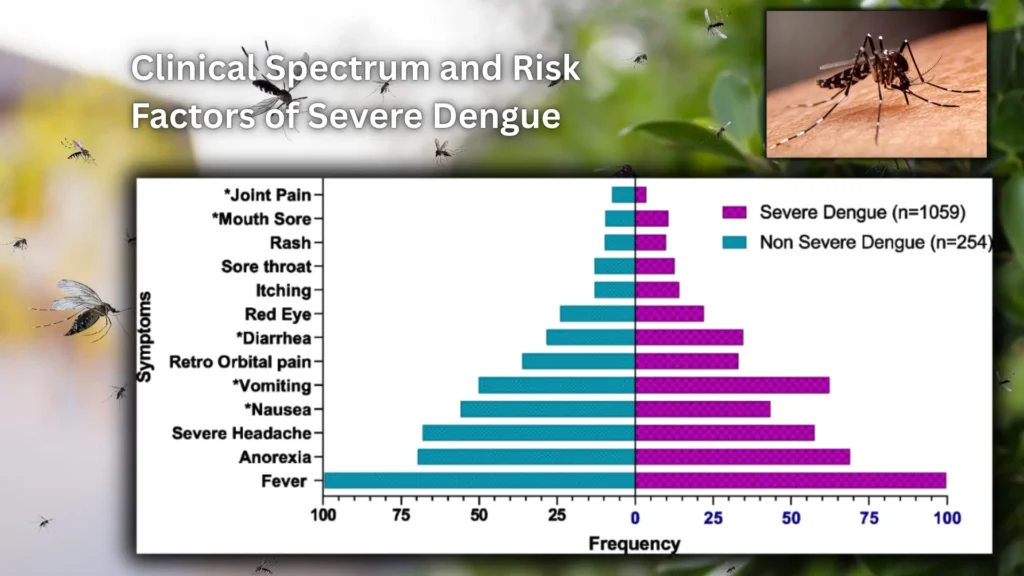Key Findings from a Major Dengue Study in Bangladesh
A new study examining the 2023 dengue outbreak in Bangladesh has identified critical risk factors and clinical symptoms associated with severe dengue infection. Published in [Journal Name], the research highlights alarming trends, including a high proportion of severe cases among young adults and males, as well as key warning signs that could help clinicians prioritize high-risk patients.
DOI: https://doi.org/10.3329/jom.v25i2.74291

Study Overview
The hospital-based cross-sectional study, conducted from August to December 2023, analyzed data from 1,313 dengue patients across multiple secondary and tertiary hospitals in Bangladesh. The research aimed to distinguish between severe and non-severe dengue cases using the 2009 WHO classification system, which categorizes dengue into:
- Non-severe dengue (with or without warning signs)
- Severe dengue (characterized by plasma leakage, severe bleeding, or organ impairment)
Key Demographic Trends
- Nearly 20% of patients developed severe dengue.
- Young adults (16–25 years) were the most affected (36.71%).
- Males accounted for two-thirds of cases (66.64%).
- Low-income households (earning <20,000 BDT/month) were disproportionately affected (41.89%).
Most Common Symptoms
The study found that fever (99.54%) was nearly universal, followed by:
- Anorexia (69.54%)
- Severe headache (66.03%)
However, gastrointestinal symptoms—such as vomiting (62.2% in severe vs. 50.05% in non-severe cases) and diarrhea (34.65% vs. 28.33%)—were significantly more prevalent in severe dengue patients.
Warning Signs of Severe Dengue
The most frequent warning signs included:
- Severe lethargy (43.64%)
- Persistent vomiting (27.57%)
- Severe abdominal pain (20.03%)
Patients with respiratory distress, altered mental status, or decreased urine output were also at higher risk of severe dengue.
Laboratory Findings
- Platelet counts dropped significantly in severe cases, particularly during the critical phase.
- Elevated ALT levels (indicating liver stress) were more pronounced in severe dengue.
Risk Factors for Severe Dengue
Using multiple logistic regression, researchers identified several factors strongly linked to severe dengue:
✔ Severe abdominal pain
✔ Severe lethargy
✔ Respiratory distress
✔ Altered mental status
✔ Decreased urine output
✔ Pleural effusion and ascites
Public Health Implications
With dengue cases rising annually in Bangladesh, this study provides crucial insights for early detection and management of severe cases. The findings emphasize:
- Monitoring gastrointestinal symptoms and warning signs in dengue patients.
- Prioritizing platelet and liver function tests for high-risk individuals.
- Enhancing public awareness to reduce delays in seeking medical care.
Conclusion
This study underscores the urgent need for improved dengue management strategies in Bangladesh, where outbreaks are becoming more frequent and deadly. By recognizing key clinical and laboratory markers, healthcare providers can better predict severe cases and reduce fatalities in future outbreaks.
References:
- Clinical spectrum and risk factors of severe dengue infection: findings from the 2023 dengue outbreak in Bangladesh – PUBMed – (Accessed on Apr 09, 2025)
- Kularatne SA, Dalugama C. Dengue infection: global importance, immunopathology and management. Clin Med. 2022;22(1):9–13. – PMC – PubMed – (Accessed on Apr 09, 2025)
- Roy SK, Bhattacharjee S. Dengue virus: epidemiology, biology, and disease aetiology. Can J Microbiol. 2021;67(10):687–702. – PubMed – (Accessed on Apr 09, 2025)
- Dengue and severe dengue. Available from:https://www.who.int/news-room/fact-sheets/detail/dengue-and-severe-dengue. Cited 2024 Feb 3. – (Accessed on Apr 09, 2025)
Possible References Used







